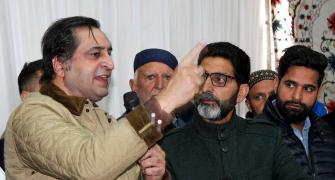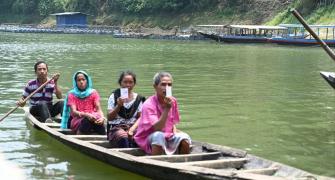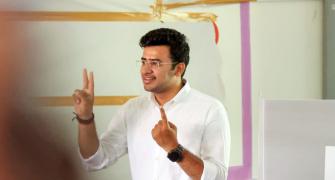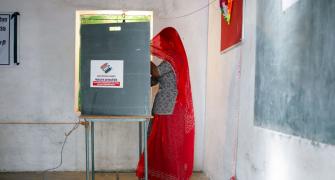Nitish Kumar, who was on Thursday sworn in as the 33rd chief minister of politically volatile Bihar, has capped his journey from being an astute political strategist to the occupant of the top post.
Blending his secularist ideology with pragmatic politics, Kumar has been the mascot of NDA's fight against the 15-year Lalu-Rabri rule, whipping up a new caste configuration.
His win also finally rid him of the tag of being a permanent aspirant for the top post, especially after a brief seven-day tryst as chief minister in March 2000 when he was sworn in despite NDA lacking a majority.
Often called 'Chanakya' (the wily prime minister of Magadh empire in ancient times) for his political astuteness, Kumar, the 54-year-old engineer with a stubble, has finally donned the mantle of Chandragupta the emperor.
His strong views on job reservations for the backward classes and Dalit Muslims notwithstanding, the wily craftsman of modern day politics did the delicate balancing act keeping votaries of both hardliners in his party and the BJP together.
Kumar, a socialist of Ram Manohar Lohia mould, plunged into student politics during his days at Bihar College of Engineering and was a key leader of 1974 students' movement under legendary Jayaprakash Narayan that culminated in the fall of the Indira Gandhi government and installation of the first non-Congress government in India in 1977.
Kumar got a Janata Party ticket to contest the assembly election from Harnaut in his native Nalanda district but lost despite an anti-Congress wave sweeping almost the entire country. Luck did not smile on him again in 1980 assembly polls when Congress staged a remarkable comeback after the failed Janata Party experiment.
Though his contemporaries like Lalu Prasad Yadav and Ram Vilas Paswan tasted electoral victory to enter the Lok Sabha in 1977, success was slow in coming for the son of a 'vaidya' Kaviraj Ram Lakhan Singh.
Clear-headed and articulate, Kumar made his mark as one of the most effective speakers and his proximity to Haryana Jat leader Devi Lal enabled him to secure a ticket to contest 1989 Lok Sabha elections from Barh against Congress heavyweight and former union minister Ramlakhan Singh Yadav whom he defeated.
There was no looking back since then as he has got re-elected to the Lok Sabha without a break and currently represents Nalanda constituency in the House.
Kumar received a setback in 2004 Lok Sabha elections when RJD's Vijay Krishna defeated him in his pocket borough Barh but he won the adjoining Nalanda seat vacated by JD(U) president George Fernandes.
Considered an able administrator, Kumar's innings in the corridors of power began with his appointment as Union Minister of State for Agriculture and Cooperatives in the National Front Government led by V P Singh in 1990.
Despite being instrumental in installation of Lalu Prasad Yadav as chief minister in 1990, Kumar's relations with the Yadav strongman became strained in the years that followed, largely due to 'imperious' style of functioning of the RJD chief.
The two parted company and Nitish, along with Fernandes and 12 other MPs, quit Janata Dal and formed Samata Party in 1994 and waged a sustained political battle against the Lalu-Rabri rule.
When the NDA came into power at the Centre in 1998, Kumar became the Railway Minister with additional charge of surface transport portfolio.
He, however, resigned owning responsibility for the Gaisal train disaster near Siliguri in West Bengal in August 1999 that claimed hundreds of lives.
Kumar was later accommodated in the Union cabinet and was agriculture minister from November 1999 to March 2000 and again from May 2000 to March 2001 before heading the railway ministry for a second time from March 2001 to May 2004.
In between, he was the chief minister of Bihar for seven days in March 2000 and was also instrumental in the merger of Samata Party with JD-U.
As he begins his stint as chief minister of a coalition government, Kumar must be aware of the enormity of not only steering through a tricky political course but also of massive development needs of an impoverished state.







